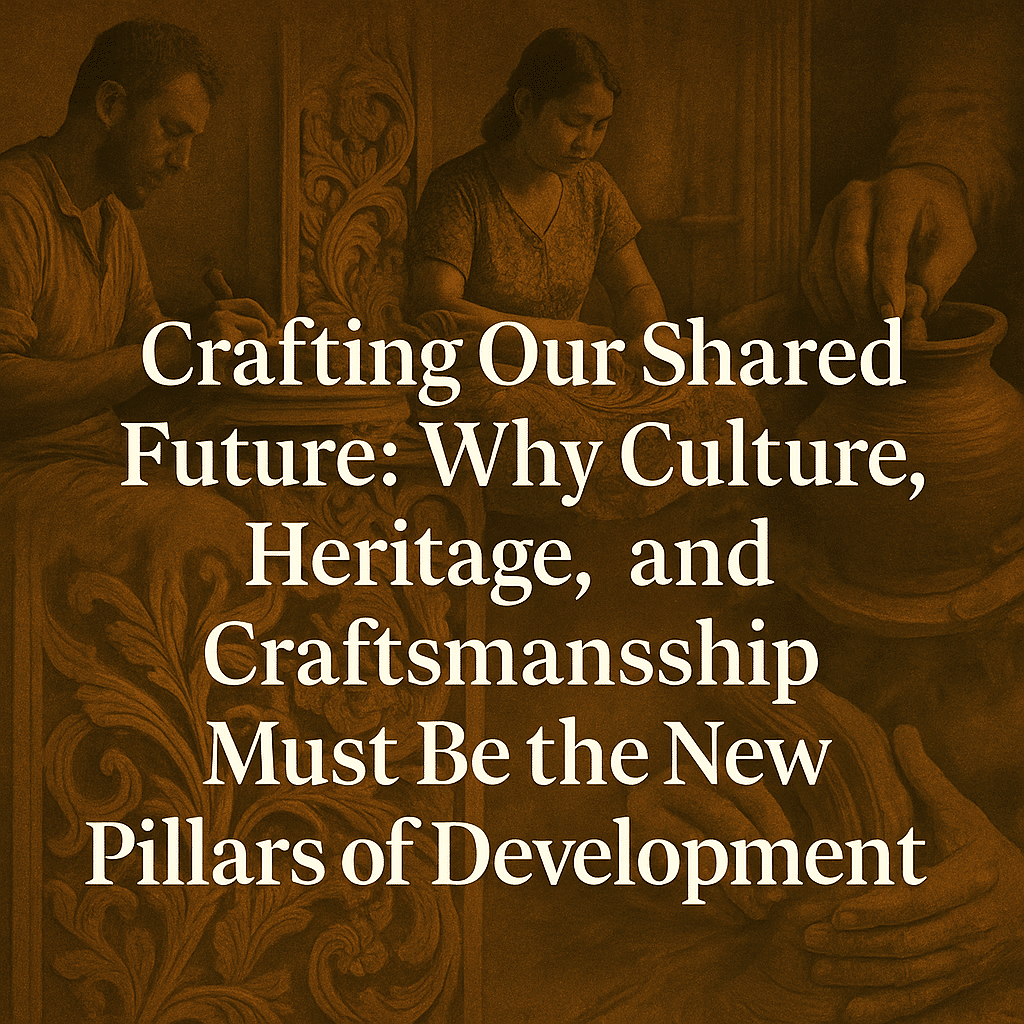For decades, we’ve been told that public-private-philanthropic collaboration is the key to solving the world’s most persistent problems. Yet in practice, we’ve seen few successes—farming, select productivity boosts, and healthcare delivery models. When it comes to training, empowerment, and livelihood development, only one model stands tall: Germany’s dual vocational training system. And even that has rarely been replicated beyond its borders. Why? Not because it’s impossible—but because most approaches ignore the real assets of the communities they claim to serve: their culture, creativity, and crafts.
At Artisanal Collective, we are focused squarely on poor communities—not out of charity, but because they contain the greatest untapped resource in the global economy: cultural memory and human creativity.
Yes, our name highlights artisanship, but artisans exist in every community, rich or poor. The 300 million artisans cited globally—mainly women, mainly informal, mostly in the Global South—generate an estimated $6.5 trillion in economic value. Take that number with a grain of salt; it’s either too high or too low. But one thing is certain: the potential is enormous. And so is the current failure.
Most artisans earn $2–$3 a day. They have no access to capital, no visibility, no means of production. Many are exploited by fragmented middlemen. They are not trained in quality control, business literacy, or access to markets. Most do not even have internet access.
Our mission is to change that.
A Simple, Powerful Framework: Training at the Village Level
Our Empowerment & Training Program targets 2–3 artisan communities per country, reaching 270–360 direct participants with shared production space, customized tools, commercial craft training, and non-craft modules in finance, digital literacy, and QA systems. We don’t overcomplicate it. We operationalize.
Parallel to that, our Master + Apprenticeship Program revives endangered crafts through Master Circles—units of 1 master and 4 apprentices, with storytelling, donor recognition, and direct LLM integration. These models are scalable, rooted, and backed by systems that work.
The Cultural Heritage & Craft LLM: Our Mars Race
People hear “AI” and think of search engines. We hear “AI” and think: what if every memory of endangered craftsmanship, every story of intergenerational wisdom, every oral history, could be preserved and used to teach, empower, and scale? We are building a Cultural Heritage and Craft LLM, aligned with the UNESCO Intangible Cultural Heritage Framework—not for fun, not for novelty, but as our planet’s next great archive. Because we believe preserving our shared past is as important as the race to Mars.
A Market Model Built for the Marginalized
We don’t just train artisans. We train them to upscale the quality of their craft, including premium and luxury products. We use storytelling (via Madame Planet), diaspora patronage, and platform branding to ensure that our artisans are not anonymous labor but visible creators. We’ve learned from Barbara Pyle, co-creator of Captain Planet, that one character can awaken a generation. We aim to do the same. Barbara is co-producing our Madame Planet storytelling series.
Ecosystem of Opportunities: From Tourism to Trade
With programs like Encounter Journeys, we link rural artisans to global consumers. Tourists meet them, learn from them, cook with them, and buy from them. Governments help develop tourism with minimal infrastructure. Our team includes experts like Dr. Jens Thraenhart, and we expect to work with global leaders like Intrepid Travel, and Elder Hostels (dba Rhodes Scholars).
Once programs gain momentum, they evolve into long-term development models—joint ventures, live artisan villages, Fête des Artisans festivals, and global awards for creativity. These aren’t concepts. They are funded, structured, and governed for impact.
Diaspora First, But Not Diaspora Only
Diaspora communities are our first funders, first adopters, and first champions. They are the custodians of memory and the bridge to modernity. We empower them to become Heritage Corps volunteers, adopt villages, fund apprenticeships, and invest in local tourism and economic models.
Not Reinventing the Wheel. Just Building a Better One.
We do not execute in isolation. We partner with the best—from Swiss Contact and Solidaridad to Dalberg for measurement and accountability. Every project is tracked, evaluated, and governed with SDG alignment and long-term viability.
Our leadership includes a 2025 Nobel Peace Prize nominee and a former UNESCO Natural Sciences Director now spearheading global AI and digital earth memory initiatives. Our governance structure is ready.
We provide laptops, internet, and AI training at every training site. We teach artisans not just how to make, but how to partner, negotiate, and grow, and women’s empowerment. We embed financial and legal guardrails. And most importantly, we build a 360-degree flywheel where knowledge holders pass on wisdom, not for money but for meaning.
If this vision resonates with you, visit our website (https://artisanalcollective.org/) and click Get Involved. Whether you are a student, a policymaker, a diaspora leader, a philanthropist, or a private sector innovator—there is a seat for you at this table.
The world doesn’t need another slogan about dignity or empowerment.
It needs the infrastructure to make it real.
And that’s what we’re building.
By Charles Kao, the founder of Artisanal Collective. He has served as a strategic advisor to cultural, technological, and development institutions globally and is the founder of Innovation for Sustainable Development.

